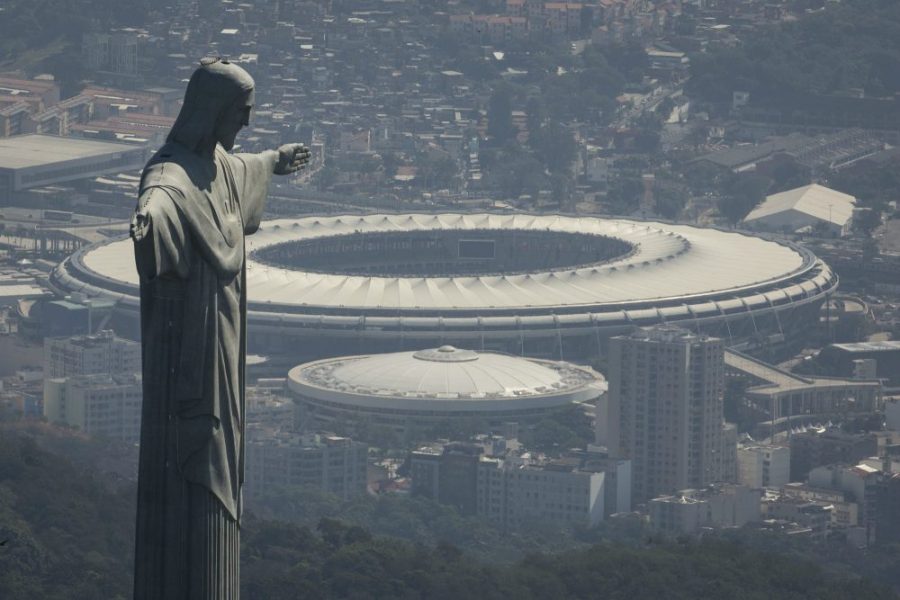The 2016 Rio Summer Olympics Review
Christ the Redeemer Statue, outside of Rio, Felipe Dana
September 13, 2016
This August, the 2016 Olympic Games were held in Rio de Janeiro, Brazil. In the midst of many incredible performances by athletes from all over the world, there were almost as many controversies as there were records. Submitted here is a summary of all the important successes and conflicts of this year’s games.
Medal count
Unsurprisingly, the US continued its streak of domination, both in number of golds (46) and in total medals earned (121). The next top gold medal earners were Great Britain (27), China (26), Russia (19), and Germany (17).
“Lochtegate”
After swimming just one relay at this year’s games, US swimmer Ryan Lochte, 32, and a few of his teammates drunkenly defaced a local bathroom at a gas station. Upon discovering what they had done, security guards demanded them to pay for the vandalism. The plot thickened when Lochte initially claimed that he and his friends were robbed at gunpoint by men masquerading as police officers. Lochte managed to flee the country before being held by authorities, along with his teammates, who paid fees to have their passports returned. Lochte has lost several major sponsorships, including Speedo and Ralph Lauren.
Patriotic Pertinence
US gymnast Gabby Douglas was lambasted for not putting her hand over her heart during the National Anthem, despite not being the first athlete to do so. The three-time Olympic gold medalist responded to her critics on Twitter, stating that she “never meant any disrespect,” and that she apologizes if she offended anyone.
Say Nope to Dope
The World Anti-Drug Agency has found Russia guilty of covering up use of performance-enhancing drugs by athletes in a wide variety of sports. Evidence points towards sample switching of clean and drug-using athletes from even before the 2014 Sochi Winter Games. Many organizations had called for a complete ban on Russian athletes, leading to Russian track and weightlifting stars to be blocked from competing.
Corruption Calamity
The Brazilian government was and still is in a state of complete turmoil. High levels of corruption throughout the system have led towards the removal of President Dilma Rousseff by the senate. Brazil is also in the midst of the largest economic recession in its modern history. Furthermore, the environmental quality of the city had been called into question, with not only a Zika epidemic, but also extremely low water and air quality. Despite these factors, Rio managed to avoid complete disaster during the games.
Hostile Hosts
The local audience of Brazilian citizens bucked the norms of Olympic hosts supporting all athletes throughout the games. According to Matt Moffett of Quartz, numerous examples of booing, to the point where pole vaulter Renaud Lavillenie cried on the podium, caused Olympic Committee President to declare the behavior “unacceptable.”
Outstanding Performances
Several countries won gold medals for the first time. Athletes from Bahrain, Fiji, Kuwait*, Cote d’Ivoire, Jordan, Kosovo, Puerto Rico, Singapore, Tajikistan, and Vietnam all won their country’s first ever gold medals. Two top athletes and media darlings, Michael Phelps and Usain Bolt, retired after the games. Phelps remains the most decorated athlete in Olympic history, with 23 golds, and 28 overall, along with several world records. Bolt has 9 golds, having retired without ever being beaten in his choice events–the 100m, 200m, and 4x100m relay.
Student Reactions
Christian Jarell, a gymnast in 12th grade who followed the Olympics, commented that the U.S. Women’s gymnastics team “did really well,” but was not very impressed by their male counterparts. When asked about how he felt about Gabby Douglas’s posture during the national anthem, he was unaffected, saying that he had “no issue.”
Nathan Donoghue, a swimmer in 12th grade, did not follow the games too closely, but made sure to catch a “race or two,” when it came to swimming. He said he thought that both the men and women of the US swim team did “pretty good.” When asked about Ryan Lochte’s actions after his performance, Nathan called them, “shameful,” and “a disgrace.”
Alyson Allen, both a senior cross-country and track runner, did watch the Olympics. Alyson said she felt that the American runners all did a solid job, especially the sprinters, who “did really well.” She also noted that the U.S. had won a medal in the men’s marathon, which was “pretty cool.” She took a strong stance against any use of performance enhancing drugs, elaborating that “you shouldn’t be allowed to participate if you’re doping.” When prompted about Usain Bolt’s, one of her “favorite runners,” retirement she says she believes that “he will change his mind,” and run in 2020.
*Kuwait is not recognized by the International Olympic Committee as an official participant.




